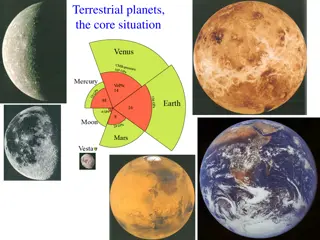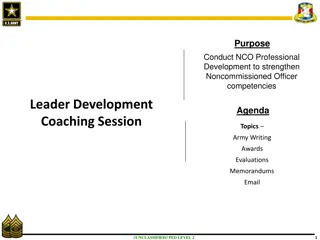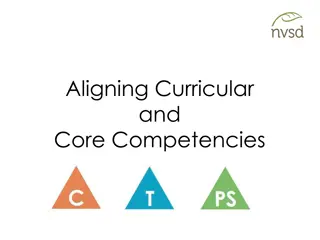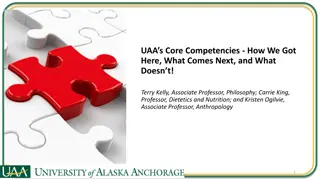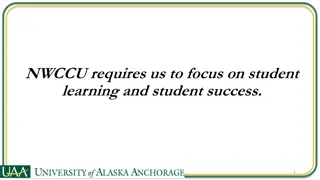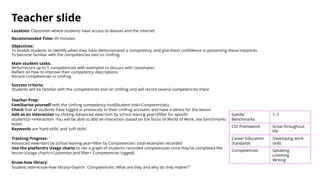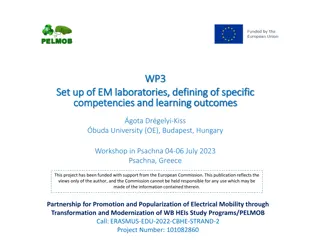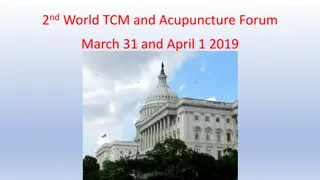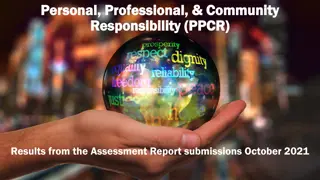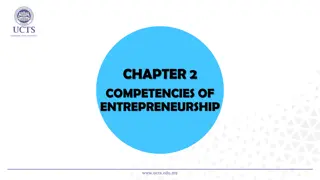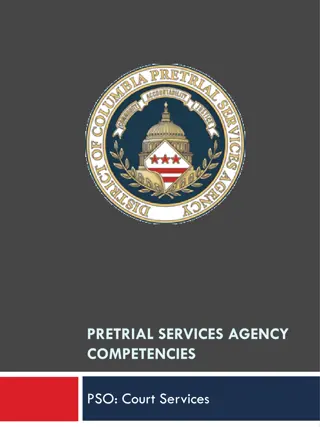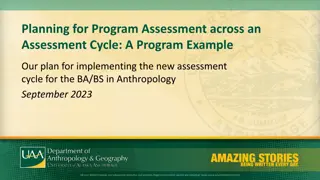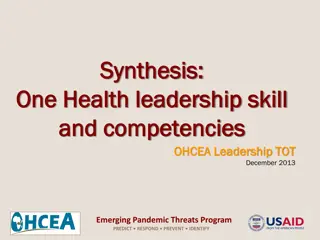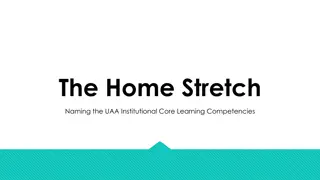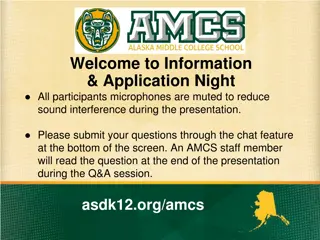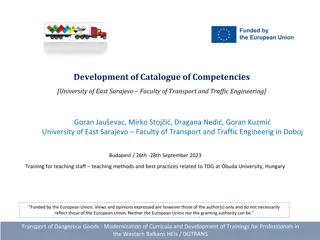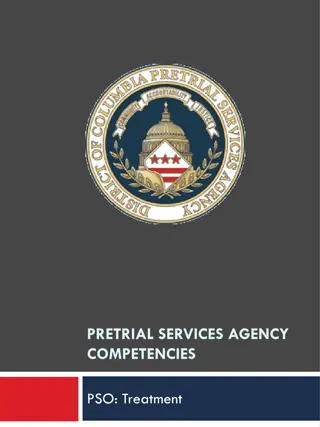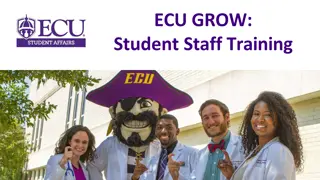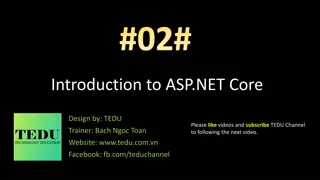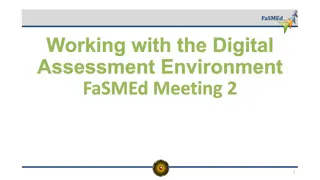Student Perspectives on Core Competencies at UAA
Explore how students perceive the development of Personal, Professional, and Community Responsibility at the University of Alaska Anchorage (UAA) through qualitative approach assessments. The focus group activities aim to capture insights on opportunities, experiences, and challenges related to core competency development. Students are encouraged to reflect on the knowledge and skills acquired for personal flourishing, professional excellence, and civic engagement. Share your UAA experiences and suggestions for enhancing skill development.
Download Presentation

Please find below an Image/Link to download the presentation.
The content on the website is provided AS IS for your information and personal use only. It may not be sold, licensed, or shared on other websites without obtaining consent from the author.If you encounter any issues during the download, it is possible that the publisher has removed the file from their server.
You are allowed to download the files provided on this website for personal or commercial use, subject to the condition that they are used lawfully. All files are the property of their respective owners.
The content on the website is provided AS IS for your information and personal use only. It may not be sold, licensed, or shared on other websites without obtaining consent from the author.
E N D
Presentation Transcript
Engaging the Student Perspective A Qualitative Approach to Assessing Student Learning in the Core Competencies
Focus Group CC Assessment: Objectives The goal of these student focus group assessment activities is to document where and how students develop the core competencies at UAA. We hope to accomplish this by soliciting and analyzing student perspectives on three related aspects of the core competency under question: Opportunities available to them related to developing the core competency both at UAA and in their lives outside of the university. Specific experiences they have had related to achieving the core competency at UAA, including where and when these experiences occurred and developed. Opportunities or experiences not available to them that they believe could have enhanced the development of the core competency or challenges they experienced in meeting the core competency.
Student Focus Group CC Assessment: Process The assessment team developed a standardized focus group guide in the form of a PowerPoint presentation with a script that includes probes for the facilitator to guide the discussions. The guide includes: An introduction to the purpose of the focus groups Brief elements of informed consent A request to complete a demographic survey Questions related to the opportunities and experiences students have had to develop the core competency
Development of Personal, Professional, and Community Responsibility on Campus UAA Student Focus Group Pilot
How do students perceive the core competencies and the opportunities to develop them at UAA? We re asking you today to share your experiences on opportunities to develop Personal, Professional, and Community Responsibility during your time at UAA.
The knowledge and skills necessary to promote personal flourishing, professional excellence, and community engagement. Personal, Professional, and Community Responsibility
Personal, Professional, and Community Responsibility Knowledge and Reasoning Skills Ethical Civic Self-reflection, assessment, and awareness judgment and decision- making knowledge, both local and global As a student, where and how at UAA do you see these skills/knowledge being developed? What specific opportunities have you had to develop these skills/knowledge as a student? Do you think there were times/places this development of these skills/knowledge could have been enhanced?
Personal, Professional, and Community Responsibility Affective Skills Self- Resilience Leadership motivation Self- reliance Integrity Empathy As a student, where and how at UAA do you see these skills being developed? What specific opportunities have you had to develop these skills as a student? Do you think there were times/places this development of these skills could have been enhanced?
Personal, Professional, and Community Responsibility Professional and Public Capabilities The ability to work effectively with others in teams Civic engagement, both local and global Responding appropriately to conflict Advocacy (for self and others) The ability to work independently in setting priorities, managing time, and meeting deadlines Staying current on changing technology and its application to the workplace Ability to take initiative and proactive in offering ideas and solutions Preparing for the professional world/development as a professional As a student, where and how at UAA do you see these capabilities being developed? What specific opportunities have you had to develop these capabilities as a student? Do you think there were times/places this development of these capabilities could have been enhanced?
Who participated in the pilot? (Major) Major 400-Level Integrative Capstone Course NSCI 11% Anthropology course BIOS 11% 10 Participants 3 engaged fully HLSC 11% 4 engaged well ANTH 67% 1 engaged partially 2 did not engage
Who participated in the pilot? (Class) Class Standing Graduate Student 10% 400-Level Integrative Capstone Course Anthropology course Junior 40% 10 Participants 3 engaged fully 4 engaged well Senior 50% 1 engaged partially 2 did not engage
Who participated in the pilot? (Semesters at UAA) Semesters at UAA 400-Level Integrative Capstone Course 4 Anthropology course 10 Participants 3 engaged fully 2 2 4 engaged well 1 engaged partially 1 1 2 did not engage fewer than 5 5 to 6 7 to 8 9 to 10 more than 10
Who participated in the pilot? (Ethnicity) Ethnicity 400-Level Integrative Capstone Course Other 10% Anthropology course Hispanic 10% 10 Participants 3 engaged fully Alaska Native 10% 4 engaged well White 70% 1 engaged partially 2 did not engage
Who participated in the pilot? (Gender Identity) Gender Identity 400-Level Integrative Capstone Course Anthropology course 10 Participants Male 50% Female 50% 3 engaged fully 4 engaged well 1 engaged partially 2 did not engage
Who participated in the pilot? (Age) Age 35-44 0% 400-Level Integrative Capstone Course 45-54 20% Anthropology course 10 Participants 25-34 10% 3 engaged fully 18-24 70% 4 engaged well 1 engaged partially 2 did not engage
What did we learn from the students? Academic Opportunities List of Academic Opportunities Gen Ed Courses Communication, Writing, Tier 2 Program Courses Environment & Society, Anthropology Diversity-Focused Courses AKNS, Geography, Anthropology Community-Engaged Courses Opportunities for hands-on work in community Team-based assignments Discussion-type courses that allow for interaction and diversity of ideas
Required Courses The only thing I can think of, are the required classes, I had to take, like, for example, geography, we talked about you know other nations and the problems they're facing in terms of water and security and things like that.
What did we learn from the students? Academic Opportunities List of Academic Opportunities Gen Ed Courses Communication, Writing, Tier 2 Program Courses Environment & Society, Anthropology Diversity-Focused Courses AKNS, Geography, Anthropology Community-Engaged Courses Opportunities for hands-on work in community Team-based assignments Discussion-type courses that allow for interaction and diversity of ideas
Program Courses In this class one of the things that it really focused on community in Anchorage, Alaska, which was very cool and one of the things that had us do that was required for the class was community development and we had to go out and participate in an event in the community, and like as far as a community service projects, they had to devote a certain amount hours which I thought was really cool that was required to the class really.
What did we learn from the students? Other Opportunities List of Academic Opportunities Gen Ed Courses Communication, Writing, Tier 2 Program Courses Environment & Society, Anthropology Diversity-Focused Courses AKNS, Geography, Anthropology Community-Engaged Courses Opportunities for hands-on work in community Team-based assignments Discussion-type courses that allow for interaction and diversity of ideas List of Other Opportunities Student Clubs Future Health Professionals Tutoring Opportunities (leadership building) Intangible skills learned through college interactions/experiences Being around people different than you University-Wide Efforts Academic Honesty on every syllabus Actions of Disability Support Services to create inclusive environment Career Services developing professionalism Handshake was specifically mentioned
Intangible Aspects It s this, especially the ethics and self-reflection, you know those are kind of those real life skills that you get through just the experience or, you know, being with your peers in the whole sort of academic setting at large, I think you know not like necessarily a specific thing, but just by virtue of being here and taking part and doing, you know. I think a lot of these skills are kind of just developed over time by you know, being in school and being with your peers like self-motivation. I don't think that's really taught in a class or covered in anything, you know, that's kind of something that, you know, you struggle with in your own sense, but you know, there are a lot of places in school that help touch on these things, but not specifically. Like slap me in the face, like yeah, we're helping you with integrity or resilience like in a little bit of a sense they do, but there is this society of leadership and success that the college offers to people and that really helps increase leadership skills, if people do that.
What did we learn from the students? List of Academic Opportunities Gen Ed Courses Communication, Writing, Tier 2 Program Courses Environment & Society, Anthropology Diversity-Focused Courses AKNS, Geography, Anthropology Community-Engaged Courses Opportunities for hands-on work in community Team-based assignments Discussion-type courses that allow for interaction and diversity of ideas List of Other Opportunities Student Clubs Future Health Professionals Tutoring Opportunities (leadership building) Intangible skills learned through college interactions/experiences Being around people different than you University-Wide Efforts Academic Honesty on every syllabus Actions of Disability Support Services to create inclusive environment Career Services developing professionalism Handshake was specifically mentioned
Student-Noted Areas of Concern or for Improvement COVID-19 has disrupted the processes that many students spoke of (team-based assignments, interactions with others, skill building)
Challenges COVID-19 Um, it s like the opportunities are out there. It's just a matter of knowing what opportunities are offered and having that self motivation to pursue them. Because when I initially started college I just kind of went. I didn't I was going for and was like go to class, go home, but now I want to start. I was gonna make a goal for myself start pushing to go to different clubs and involving myself more in different communities within UAA Just not having a campus to go to and sit down and study at, and you know mingle with your peers that's definitely, that not being around, is definitely a challenge
Student-Noted Areas of Concern or for Improvement (continued) COVID-19 has disrupted the processes that many students spoke of (team-based assignments, interactions with others, skill building) Students mentioned you can just get by without engaging in many things and there isn t always a clear path to involvement (especially for students with less experience putting themselves out there) Some students wanted to see more across-the-board inclusion of community-engaged curriculum, every student should see it
What did we learn about the process? Streamlined demographic questions based on a mess of data May need to combine all elements of PPCR (cognitive, affective, and behavioral skills) into one slide as students really wanted to talk about behavior Students struggled with identifying where they learn affective skills (e.g., responsibility, empathy) Too nuanced a distinction between where and how they develop the competency and specific opportunities they had. Any ideas? Need more student groups! Any ideas (or volunteers)? Different levels of students More diversity in backgrounds, majors, etc.
Engaging the Student Perspective: Graduate Exit Survey What would we want to ask on such a survey?


